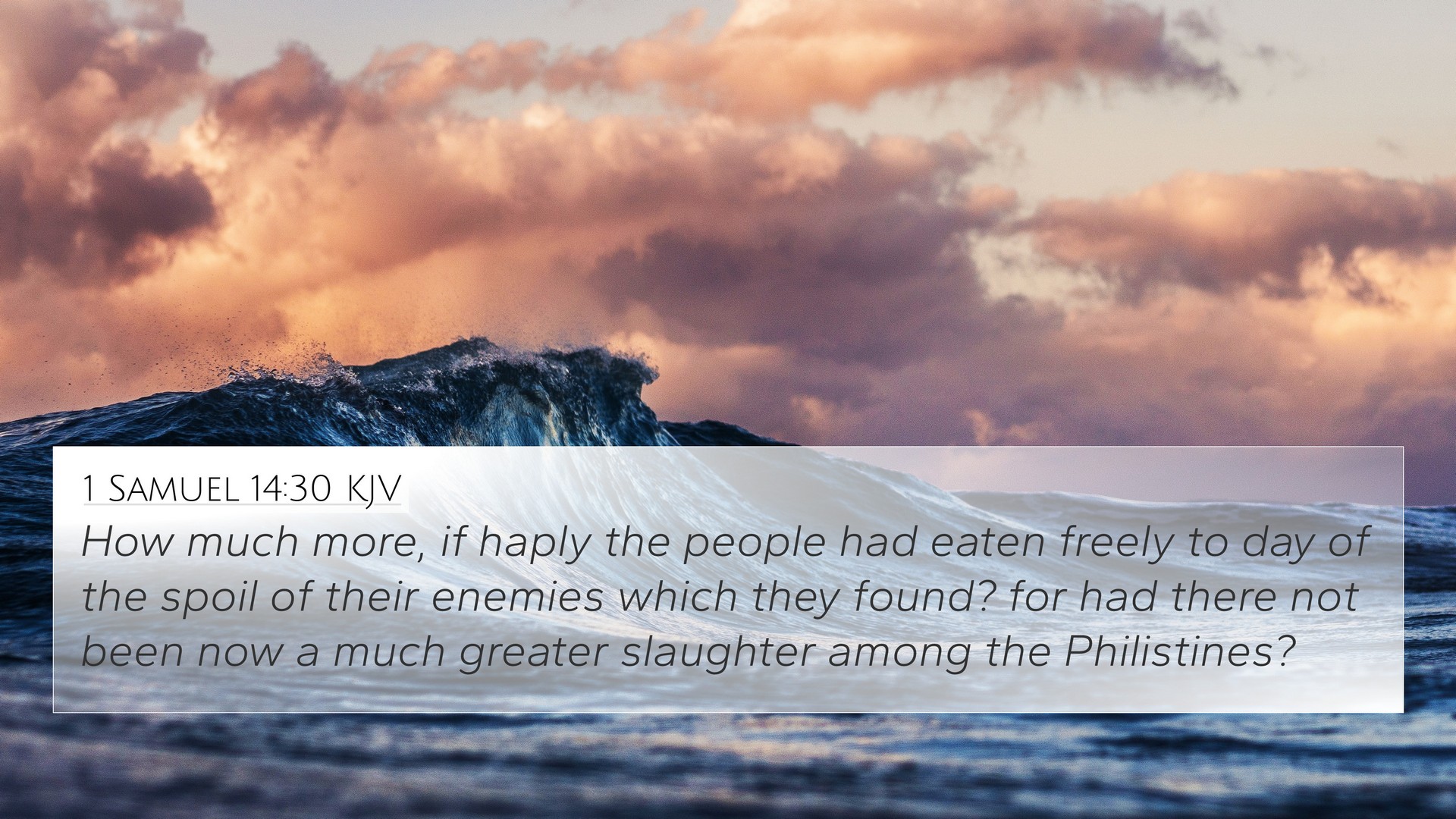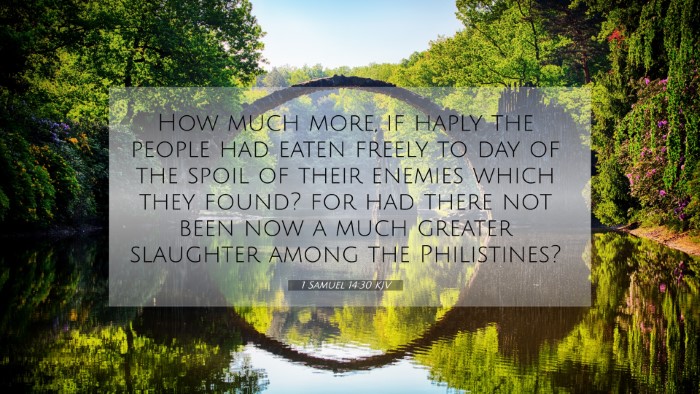Understanding 1 Samuel 14:30
The verse 1 Samuel 14:30 states: "How much better if the people had eaten freely today of the spoil of their enemies which they found? For now the defeat among the Philistines has not been great." This verse speaks to the consequences of hasty and misguided actions in leadership and the importance of wise decisions.
Below are insights drawn from public domain commentaries by Matthew Henry, Albert Barnes, and Adam Clarke, integrating their teachings on this passage.
Commentary Insights
-
Matthew Henry's Commentary:
Henry emphasizes the importance of understanding the consequences of Saul's rash oath that his soldiers should not eat until evening. He highlights that this led to a weakened army and a greater loss against their enemies, suggesting that such impulsive decisions can have broader implications. He notes that if the people had been allowed to feast on the spoils, their morale and strength would have increased, likely leading to a more significant victory over the Philistines.
-
Albert Barnes' Notes:
Barnes reflects on the theme of leadership and the responsibilities that come with it. He points out that Saul’s command created unnecessary hardship for the soldiers and that wisdom in leadership requires recognizing when generosity and nourishment are more beneficial than strict asceticism. The verse illustrates a recognition that their success is not solely dependent on the stringent adherence to laws or calls for fasting, but also on proper sustenance and encouragement.
-
Adam Clarke's Commentary:
Clarke delves into the cultural and historical context of the time, explaining that the act of eating the spoils was traditional and vital to reinforcing the troops' strength and unity. He comments on the irony of Saul's leadership style, which, while aiming for strict obedience, backfired and led to a weakened position against their foes. Clarke also stresses the lesson on the balance of authority and compassion in leading others, particularly in times of conflict.
Thematic Connections and Cross-References
1 Samuel 14:30 connects with several other verses that echo themes of leadership, nourishment, and the repercussions of commands. Here are notable biblical cross-references to this passage:
- 1 Samuel 9:21 - Highlights the humility of Saul, leading to reflections on leadership priorities.
- 1 Samuel 13:13-14 - Discusses Saul's failed leadership decisions and their consequence.
- Proverbs 15:22 - Indicates that wise counsel and flexibility in decision-making pave the way for success.
- Matthew 12:7 - Jesus emphasizes mercy over sacrifice, aligning with the idea that people's well-being is essential.
- Luke 14:21-23 - Speaks to the importance of inviting those who are excluded, paralleling ideas of nourishment and support.
- 1 Corinthians 9:7 - Paul discusses the support and sustenance of those who labor in the ministry, resonating with the importance of nourishment.
- Philippians 4:12-13 - Illustrates the strength that comes from knowing when to feast or fast, linking back to the implications of Saul's decisions.
- Acts 15:28-29 - Reflects early church decisions on what burdens should or shouldn’t be placed upon believers, in relation to leadership guidance.
- Romans 14:17-19 - Paul discusses the kingdom of God being about righteousness, peace, and joy, reinforcing the theme of positive nourishment in a spiritual context.
- Galatians 6:2 - Encourages carrying one another’s burdens, which resonates with the need for leadership to prioritize well-being.
Conclusion
In 1 Samuel 14:30, we see a fundamental truth about leadership and decision-making — that wisdom should prevail over haste and that nourishment, both physical and spiritual, is essential in times of conflict. The commentary insights combined with relevant cross-references paint a broader understanding of the implications of Saul's actions, offering lessons on the importance of balance in leadership and the well-being of those one leads.
This exploration encourages further study into the connections between Bible verses, demonstrating how various scriptures interrelate to illuminate specific themes regarding leadership and collective strength. By cross-referencing these biblical texts, one can derive deeper insights into God's expectations and teachings, ultimately guiding personal and communal faith practices.



